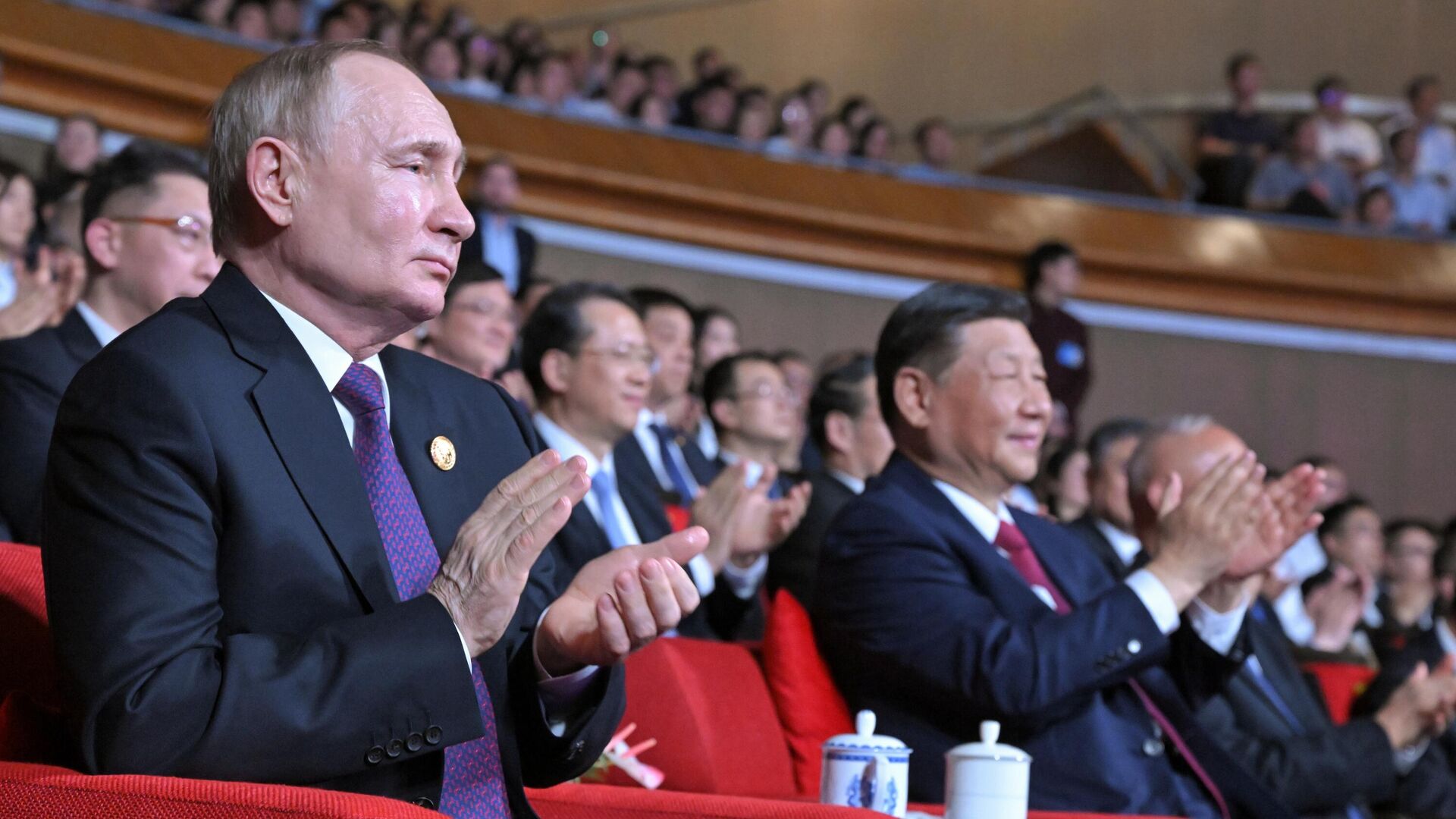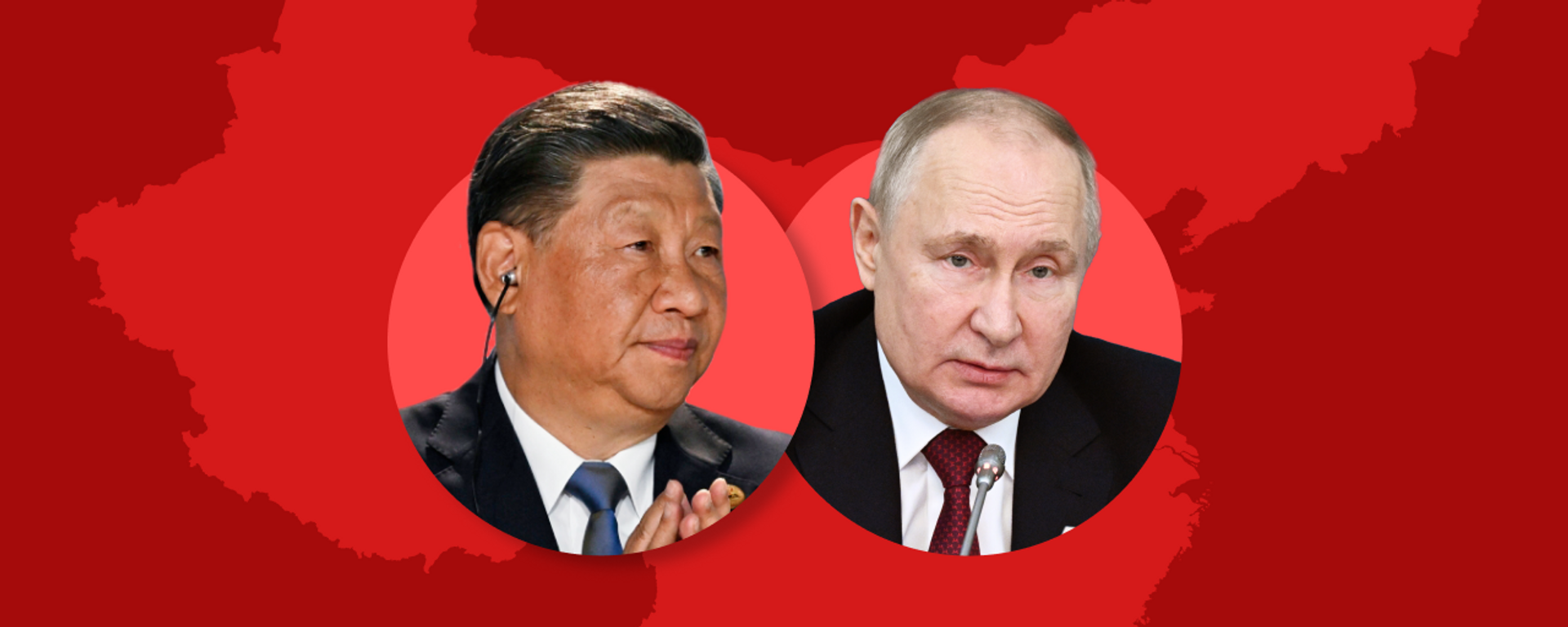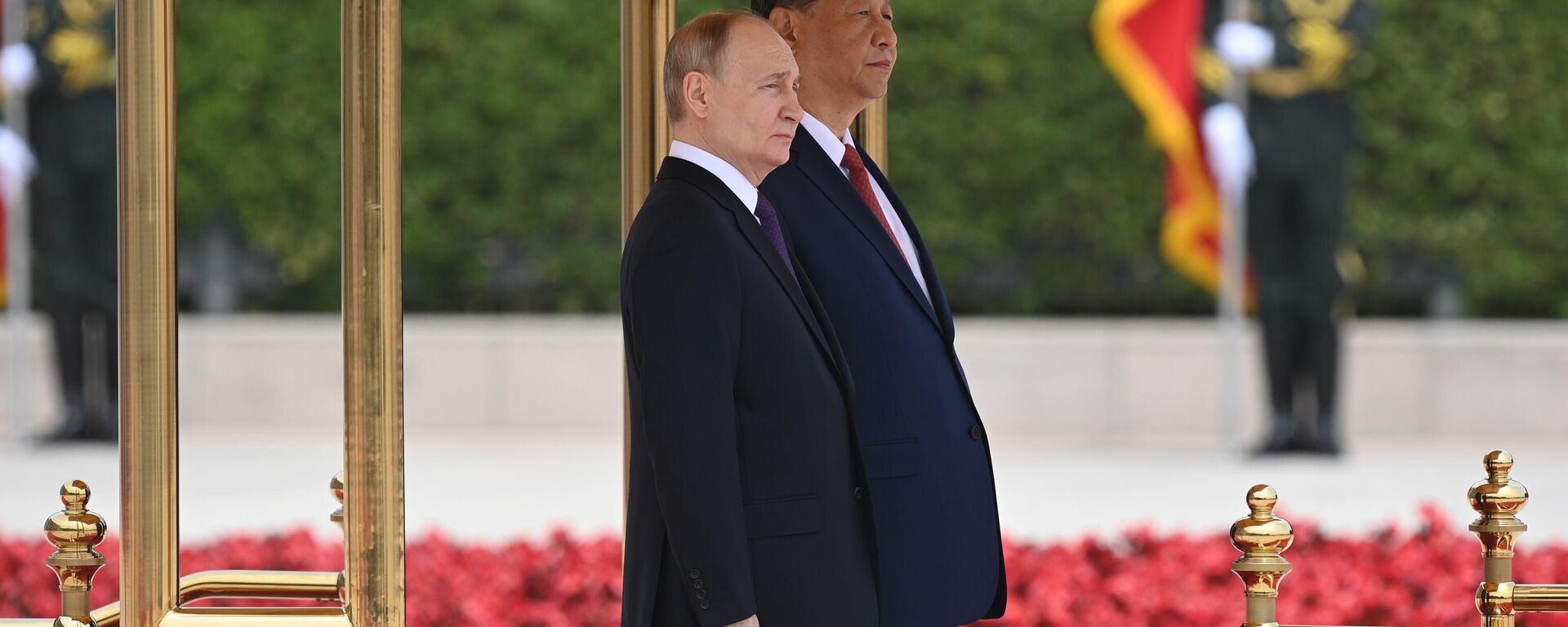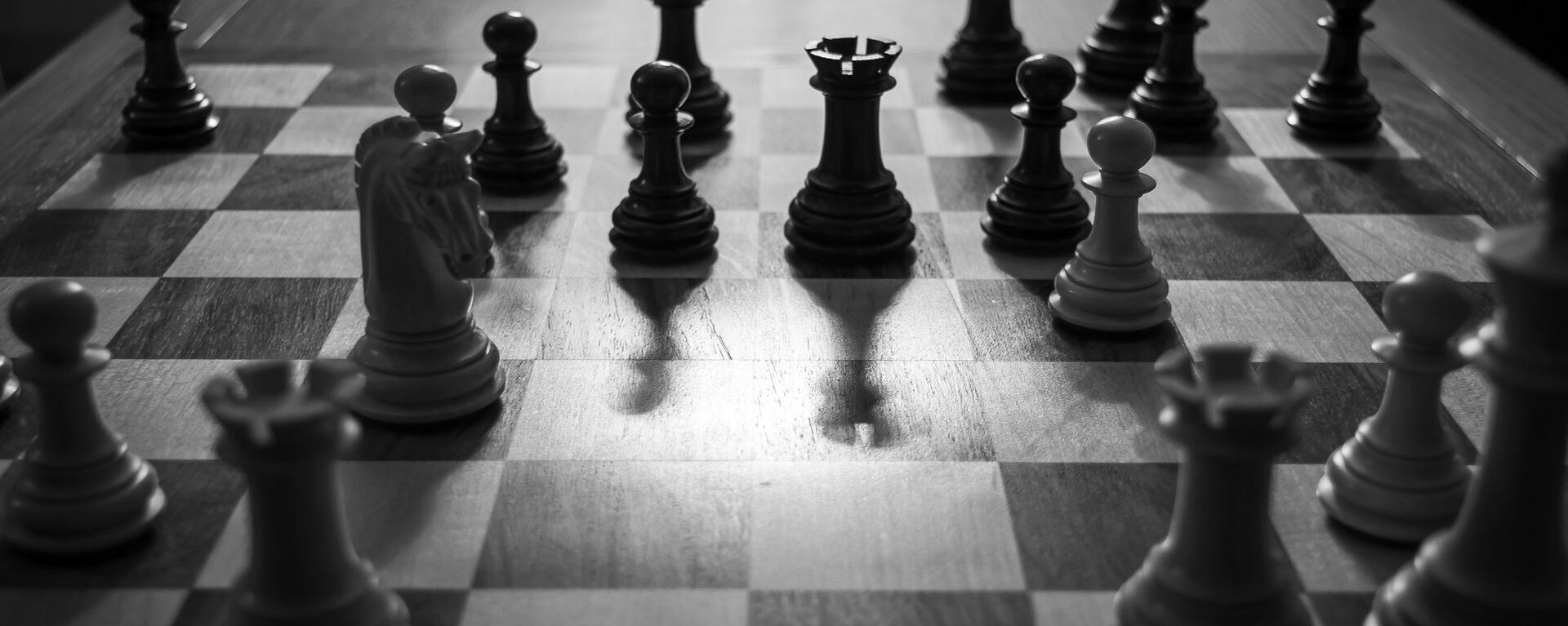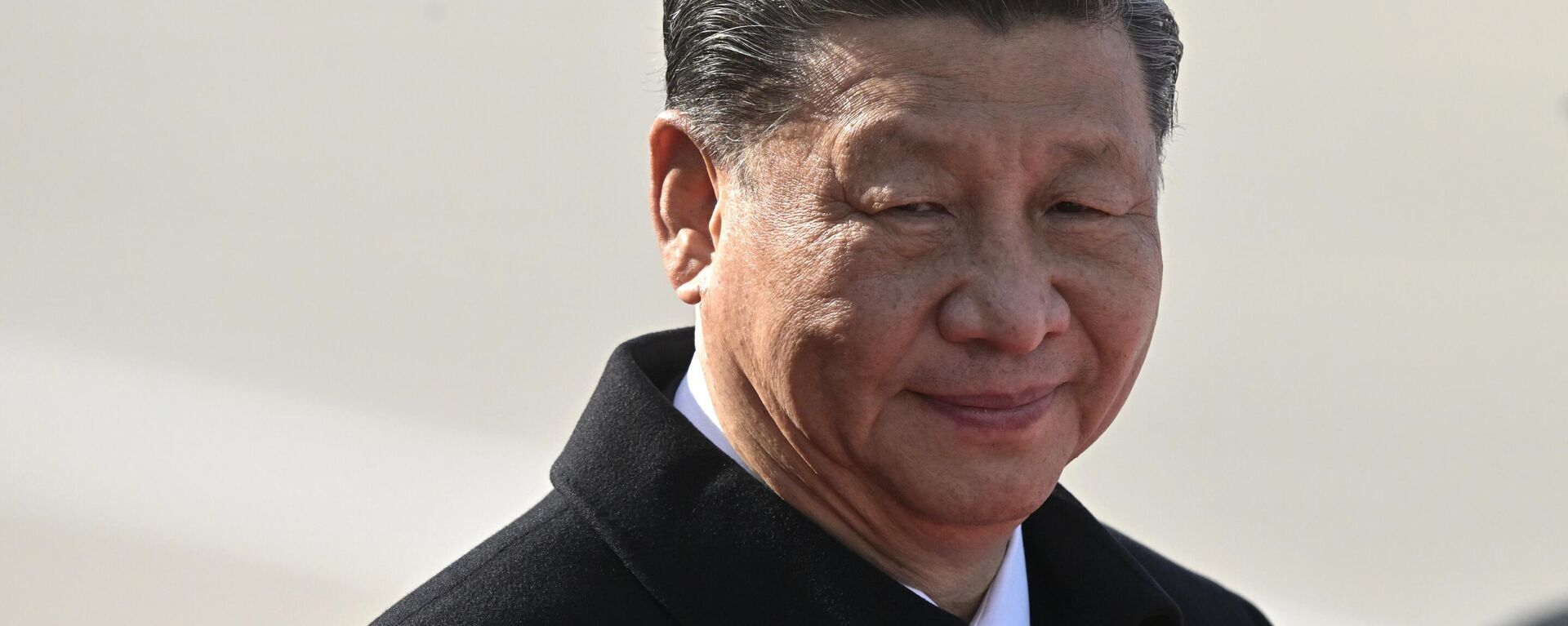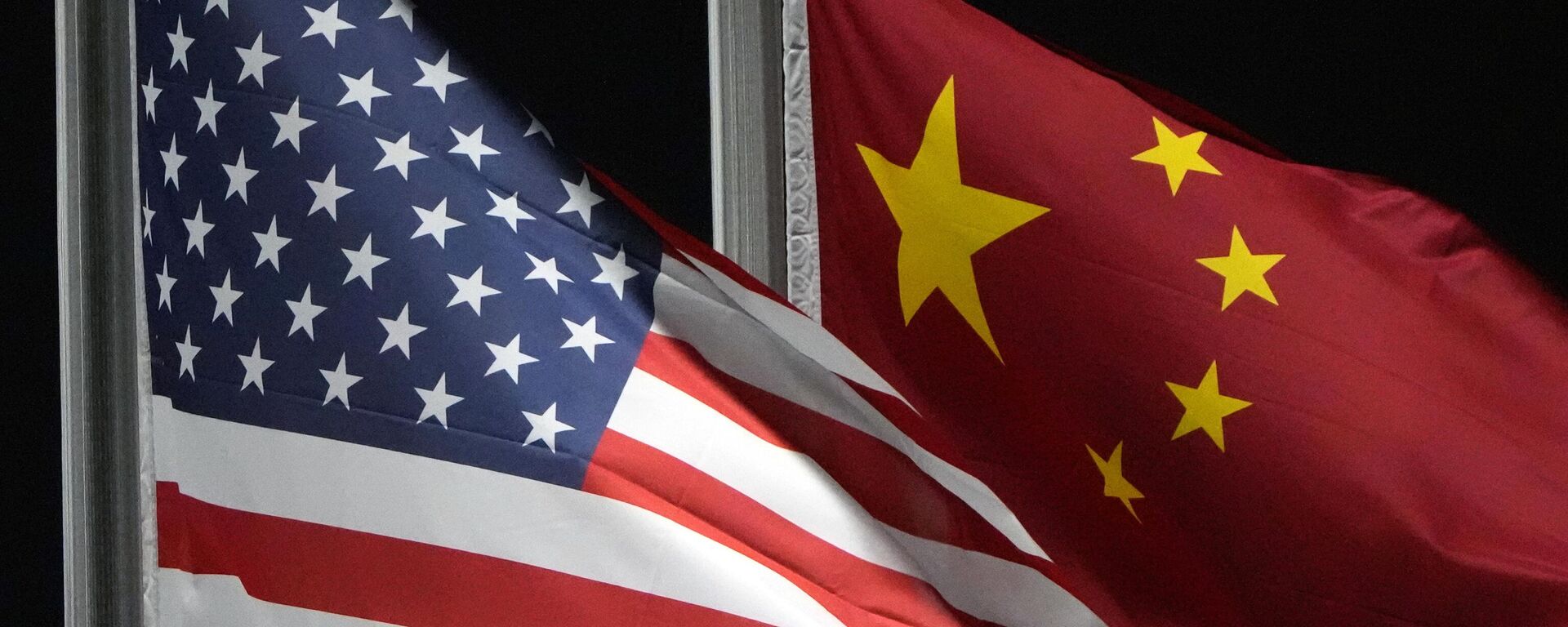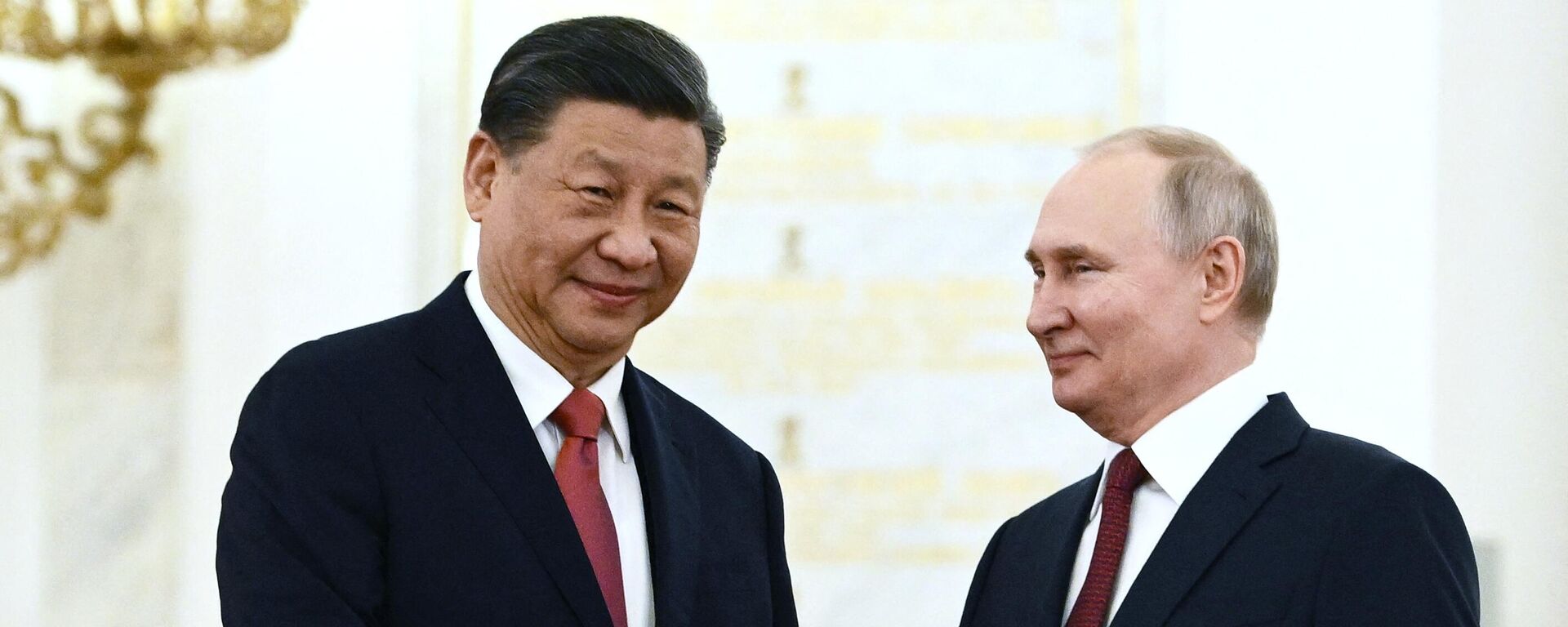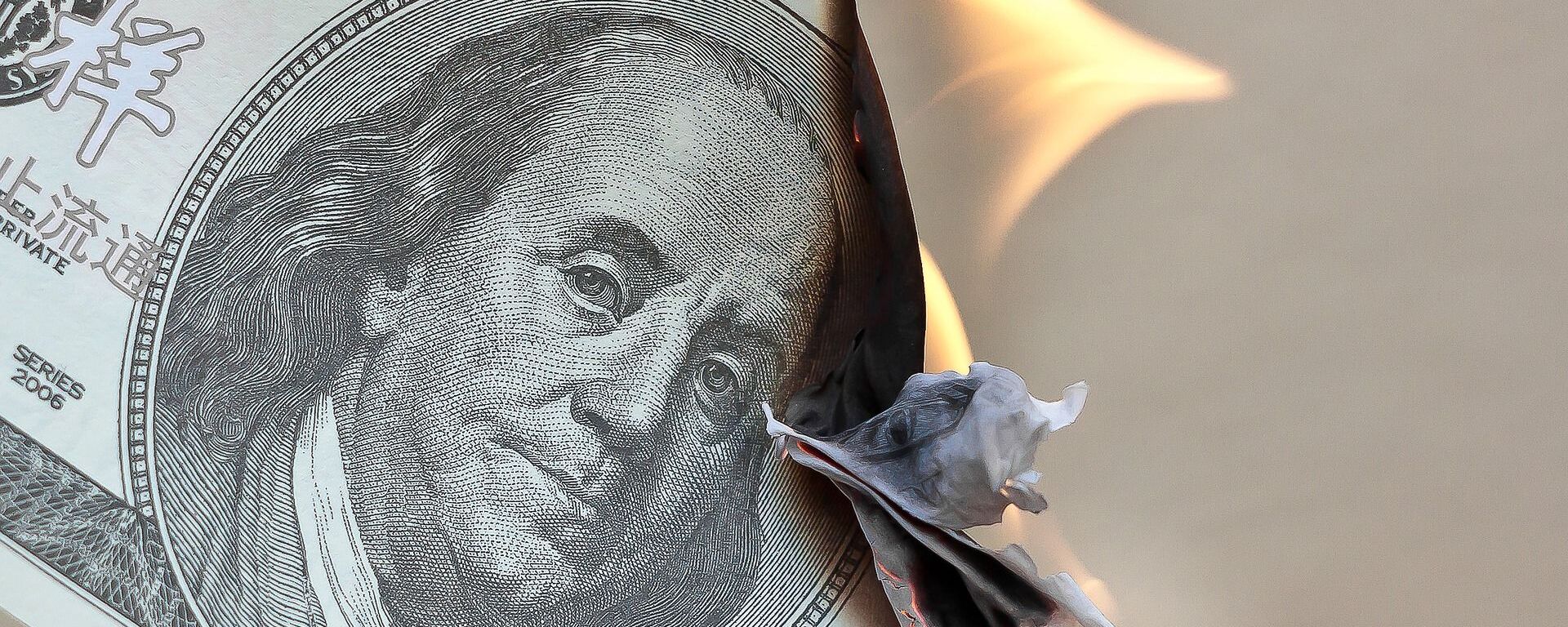https://sputnikglobe.com/20240516/kissingers-nightmare-us-bid-to-crush-russia--china-economically-only-drives-them-closer-1118474909.html
Kissinger’s Nightmare: US Bid to Crush Russia & China Economically Only Drives Them Closer
Kissinger’s Nightmare: US Bid to Crush Russia & China Economically Only Drives Them Closer
Sputnik International
Vladimir Putin arrived in Beijing Thursday for the first visit abroad of his new term as Russia’s president. Sputnik queried respected economic, international affairs and security observers to learn about the processes driving Russia-China cooperation, and why US efforts to hinder both countries’ development has only made them stronger.
2024-05-16T13:57+0000
2024-05-16T13:57+0000
2024-05-16T13:57+0000
analysis
vladimir putin
henry kissinger
china
russia
beijing
nato
brics
eurasian economic union
xi jinping
https://cdn1.img.sputnikglobe.com/img/07e8/05/10/1118474253_0:181:2997:1867_1920x0_80_0_0_2825086abfffa8380f0dc9cdc1f6011d.jpg
President Putin described Russian-Chinese cooperation in world affairs as “one of the main stabilizing factors in the international arena” after his meeting with President Xi Jinping, emphasizing that the two countries jointly uphold the principles of a fair and democratic world order that reflects the rise of global multipolarity.“We are determined to further harmonize integration processes in the Eurasian space, to match the potentials of the Eurasian Economic Union, and, my dear friend, your One Belt One Road Initiative,” Putin told his Chinese counterpart.On the economic front, Putin said that bilateral trade is continuing to set records, hitting a new high equivalent to $227 billion in 2023, with Russia continuing to climb up the ladder among China’s top trade partners, and prioritizing cooperation in energy, industry and agriculture.President Xi echoed Putin’s assessment of the importance of warm Russia-China ties, emphasizing that the stable development of the relationship will be “conducive to peace, stability and prosperity in the region and the world.”Russia-China ties have “become stronger over time, withstood the test of international storms and clouds, and set a model of mutual respect, frankness, harmony and mutual benefit,” Xi said.The Chinese leader pointed to Beijing and Moscow’s joint commitment to “fairness and justice” in relations, and cited the “Cold War mentality…unilateralism, hegemonism, bloc confrontation and power politics” pursued by some nations today as threats to peace and international security.US Foreign Policy Gurus Spinning in Their GravesPresident Putin’s visit to China (his 18th to date) comes less than 48 hours after the US slapped tough new 25-100% tariffs on a broad array of Chinese goods, from critical minerals, steel and aluminum to lithium batteries, semiconductors, solar power cells, ship-to-shore cranes, electric vehicles and medical products. The restrictions, announced following a review of Trump-era policies amounting to a multi-trillion dollar US trade war against Beijing, were blasted by China’s Commerce Ministry as a severe “violation” of Washington’s commitment “not to seek to suppress or contain China’s development.”“A grand coalition of China and Russia united not by ideology but by complementary grievances” would pose “the most dangerous scenario” as far as threats to US hegemony are concerned, Brzezinski wrote in his 1997 treatise ‘The Grand Chessboard’, echoing and building on work begun by Kissinger in the early 1970s to institute his famous ‘triangular diplomacy’ doctrine in relation toward Moscow and Beijing.Contemporary US foreign policy leaders appear dead set on sabotaging this tried and tested strategy, first sabotaging relations with Russia, staging coups along its perimeter and ignoring Moscow’s security concerns by expanding NATO, and then kicking off a similar process against China, launching a trade war, strengthening anti-China security alliances in the Asia-Pacific, provoking Beijing over Taiwan, and most recently, flirting with the idea of turning the AUKUS security alliance into a new anti-China ‘Asian NATO’.“For many years Russia, China, and a growing list of other nations targeted by US-led sanctions have been working on alternative financial, economic, and trade mechanisms to sidestep such sanctions and continue building both national and regional self-sufficiency as well as economic strength,” Berletic explained. “These efforts have finally reached a critical mass, displacing dependence on the US dollar and allowing Russia, China, and many other nations to now insulate themselves from the impact of Western sanctions,” he emphasized.In this new world, Western attempts to pressure nations into submission through economic means are no longer as effective as they once were, and are “more likely to isolate the West itself rather than the nations it is targeting,” Berletic believes.Economic cooperation is key to Russia and China’s partnership, the former soldier said, since it lays “a solid foundation for both nations to develop other essential areas of national and mutual growth,” and enabling both to circumvent Western attempts to encircle and contain them, but also to take advantage of the complementary characteristics of one another’s economies. Russia’s vast natural resources, coupled with China’s immense industrial base, “represent more than a match for the collective West’s economic power,” in Berletic’s view.Accordingly, the two countries’ cooperation, and moves by other nations targeted and coerced by the collective West to join this new economic pole, will eventually build “the critical mass required for Russia and China’s multipolar vision to permanently overtake the US-led unipolar world order,” he said.In such a security environment, the more friends China has in its corner, the better.Perfect TimingPutin’s visit on the heels of the US tariff hike announcement could not have come at a better time, providing Russian producers new opportunities to expand their footprint in China’s markets, and giving Beijing with a solid, trusted economic partner in an uncertain world, says Wang Yiwei, director of the People’s University of China’s Institute of International Affairs.The sky’s really the limit as far as Russian-Chinese economic cooperation is concerned, Wang believes, pointing out that trade turnover between the two countries is approaching the $300 billion mark. “If we take into account the potential of the two countries, I believe that there’s still room for further growth.”With Russia-China relations entering a “new era,” cooperation can be expected to expand into new areas, including agriculture. The timing is perfect for this, according to Wang.Russia and China are also made for one other as far as trade in a time of global economic uncertainty is concerned, Wang emphasized, pointing out that their ability to stably and safely trade overland instead of by sea gives both the opportunity to substantially “reduce risks in global trade.”Undermining the DollarWashington’s attempts to restrict Russian and Chinese development using punitive economic tools may seem like the right approach to restricting both countries’ growth, but are actually counterproductive, threatening the very foundations on which America’s economic prosperity rests, says Thomas W. Pauken II, a veteran China, trade and economics expert and author, and Asia-Pacific affairs consultant.“So we're going to see a growing trend of more countries finding ways to support cross-border trade and international financial transactions outside the US dollar, such as, maybe not using Swift as much, but trying to set up new technologies to improve, to have bank wires that are not really connected to the US and not connected to the US dollar. So we're going to see more of that, but it's going to take time for this technology to develop so that it becomes very efficient. I would anticipate it's going to take another 3 to 5 years for countries to adapt to the new ways of trading without the US dollar,” the observer predicted.As for the near-term prospects of Russia-China cooperation, Pauken said technology, agriculture and energy are fields to really watch for in the coming years. “These types of agreements are going to create a much stronger partnership,” the observer noted.That, in turn will add to the resilience of both countries in the long run.
https://sputnikglobe.com/20240516/infographics-how-many-times-vladimir-putin-and-xi-jinping-have-met-1118468630.html
https://sputnikglobe.com/20240516/putin-xi-adopt-joint-statement-on-deepening-comprehensive-partnership-1118467484.html
https://sputnikglobe.com/20230320/brzezinskis-grand-chessboard-vision-of-russia-china-pact-becomes-reality-as-biden-antagonizes-both-1108616115.html
https://sputnikglobe.com/20240511/xis-grand-chess-game-how-china-outplays-us-in-europe-1118386978.html
https://sputnikglobe.com/20240515/nobody-wins-us-hikes-tariffs-on-china-as-economic-tensions-continue-to-rise-1118433962.html
https://sputnikglobe.com/20240515/putin-visits-beijing-as-biden-bogged-down-in-efforts-to-undermine-russia-china-1118436022.html
https://sputnikglobe.com/20240513/de-dollarization-bombshell-the-coming-of-brics-decentralized-monetary-ecosystem-1118409748.html
china
russia
beijing
Sputnik International
feedback@sputniknews.com
+74956456601
MIA „Rosiya Segodnya“
2024
News
en_EN
Sputnik International
feedback@sputniknews.com
+74956456601
MIA „Rosiya Segodnya“
Sputnik International
feedback@sputniknews.com
+74956456601
MIA „Rosiya Segodnya“
are russia and china allies, do russia and china pose a threat to us, are russia and china going to build a new world order, trade in dollar, new international reserve currency
are russia and china allies, do russia and china pose a threat to us, are russia and china going to build a new world order, trade in dollar, new international reserve currency
Kissinger’s Nightmare: US Bid to Crush Russia & China Economically Only Drives Them Closer
Vladimir Putin arrived in Beijing Thursday for the first visit abroad of his new term as Russia’s president. Sputnik queried respected economic, international affairs and security observers to learn about the processes driving Russia-China cooperation, and why US efforts to hinder both countries’ development has only made them stronger.
President Putin described Russian-Chinese cooperation in world affairs as “one of the main stabilizing factors in the international arena” after his meeting with President Xi Jinping, emphasizing that the two countries jointly uphold the principles of a fair and democratic world order that reflects the rise of global multipolarity.
“It is of fundamental importance that the Russia-China relationship is not opportunistic and not directed against anyone,” Putin said, noting that “Russia and China are successfully cooperating in the United Nations, BRICS, the Shanghai Cooperation Organization, as well as the G20.”
“We are determined to further harmonize integration processes in the Eurasian space, to match the potentials of the Eurasian Economic Union, and, my dear friend, your One Belt One Road Initiative,” Putin
told his Chinese counterpart.
On the economic front, Putin said that bilateral trade is continuing to set records, hitting a new high equivalent to $227 billion in 2023, with Russia continuing to climb up the ladder among China’s top trade partners, and prioritizing cooperation in energy, industry and agriculture.
President Xi echoed Putin’s assessment of the importance of warm Russia-China ties, emphasizing that the stable development of the relationship will be “conducive to peace, stability and prosperity in the region and the world.”
Russia-China ties have “become stronger over time, withstood the test of international storms and clouds, and set a model of mutual respect, frankness, harmony and mutual benefit,” Xi said.
The Chinese leader pointed to Beijing and Moscow’s joint commitment to “fairness and justice” in relations, and cited the “Cold War mentality…unilateralism, hegemonism, bloc confrontation and power politics” pursued by some nations today as threats to peace and international security.
“A mountain is formed by the accumulation of soil, and an ocean is created by the accumulation of water,” Xi
said, using a Chinese proverb to refer to the state of Russia-China ties. “After 75 years of solid accumulation, lasting friendship and all-round cooperation between China and Russia provide a strong impetus for the two countries to forge ahead despite wind and rain,” Xi assured.
US Foreign Policy Gurus Spinning in Their Graves
President Putin’s visit to China (his 18th to date) comes less than 48 hours after the US
slapped tough new 25-100% tariffs on a broad array of Chinese goods, from critical minerals, steel and aluminum to lithium batteries, semiconductors, solar power cells, ship-to-shore cranes, electric vehicles and medical products. The restrictions, announced following a review of Trump-era policies amounting to a multi-trillion dollar US trade war against Beijing, were blasted by China’s Commerce Ministry as a severe “violation” of Washington’s commitment “not to seek to suppress or contain China’s development.”
Restrictions against China, complementing the thousands of sanctions Washington and its allies have slapped on Russia over the past decade, threaten to put the last nail in the coffin of the grand strategy Washington has pursued in relation to both countries through much of the second half of the 20th century. The vision, laid out by foreign policy gurus Henry Kissinger and Zbigniew Brzezinski, centered around efforts to keep Russia and China divided to prevent them from combining their respective strengths to challenge American hegemony.
“A grand coalition of China and Russia united not by ideology but by complementary grievances” would pose “the most dangerous scenario” as far as threats to US hegemony are concerned, Brzezinski
wrote in his 1997 treatise ‘The Grand Chessboard’, echoing and building on
work begun by Kissinger in the early 1970s to institute his famous ‘triangular diplomacy’ doctrine in relation toward Moscow and Beijing.
Contemporary US foreign policy leaders appear dead set on sabotaging this tried and tested strategy, first sabotaging relations with Russia, staging coups along its perimeter and ignoring Moscow’s security concerns by expanding NATO, and then kicking off a similar process against China, launching a trade war, strengthening anti-China security alliances in the Asia-Pacific, provoking Beijing over Taiwan, and most recently, flirting with the idea of turning the AUKUS security alliance into a new anti-China ‘Asian NATO’.
“Both nations find themselves targeted by a long-standing, aggressive US foreign policy of encirclement and containment, making cooperation together a logical choice,” veteran foreign affairs analyst and former US Marine Brian Berletic told Sputnik in a commentary on both the “practical and symbolic” significance of Putin’s Beijing jaunt.
“For many years Russia, China, and a growing list of other
nations targeted by US-led sanctions have been working on alternative financial, economic, and trade mechanisms to sidestep such sanctions and continue building both national and regional self-sufficiency as well as economic strength,” Berletic explained. “These efforts have finally reached a critical mass, displacing
dependence on the US dollar and allowing Russia, China, and many other nations to now insulate themselves from the impact of Western sanctions,” he emphasized.
In this new world, Western attempts to pressure nations into submission through economic means are no longer as effective as they once were, and are “more likely to isolate the West itself rather than the nations it is targeting,” Berletic believes.
Economic cooperation is key to
Russia and China’s partnership, the former soldier said, since it lays “a solid foundation for both nations to develop other essential areas of national and mutual growth,” and enabling both to circumvent Western attempts to encircle and contain them, but also to take advantage of the complementary characteristics of one another’s economies. Russia’s vast natural resources, coupled with China’s immense industrial base, “represent more than a match for the collective West’s economic power,” in Berletic’s view.
Accordingly, the two countries’ cooperation, and moves by other nations targeted and coerced by the collective West to join this new economic pole, will eventually build “the critical mass required for Russia and China’s multipolar vision to permanently overtake the US-led unipolar world order,” he said.
On the security front too, the ex-Marine emphasized that Beijing undoubtedly recognizes Washington’s push to expand NATO to the Asia-Pacific region, resulting in “the same destabilizing and destructive effects NATO has already had across Europe, North Africa, the Middle East and even as far as Central Asia. US policymakers are already crafting policies for anti-China proxies in the Asia-Pacific region such as Taiwan and the Philippines based on Washington’s use of Ukraine as a proxy against Russia in Eastern Europe.”
In such a security environment, the more friends China has in its corner, the better.
Putin’s visit on the heels of the US tariff hike announcement could not have come at a better time, providing Russian producers new opportunities to expand their footprint in China’s markets, and giving Beijing with a solid, trusted economic partner in an uncertain world, says Wang Yiwei, director of the People’s University of China’s Institute of International Affairs.
“Regardless of who comes to power in the United States after the elections, difficulties in US-China relations are most likely to persist. This relationship will continue to face many challenges. In these conditions, ensuring the stability of foreign economic cooperation and supply chains, cooperation with countries with which there is a high level of strategic mutual trust, especially with neighboring countries, is a priority area of development for China,” Wang told Sputnik.
The sky’s really the limit as far as Russian-Chinese economic cooperation is concerned, Wang believes, pointing out that trade turnover between the two countries is approaching the $300 billion mark. “If we take into account the potential of the two countries, I believe that there’s still room for further growth.”
With Russia-China relations entering a “new era,” cooperation can be expected to expand into new areas, including agriculture. The timing is perfect for this, according to Wang.
“It’s well-known that Russia is a large exporter of agricultural goods, and while China previously mainly purchased agricultural products from the United States, the negative impact of customs duties by the American side has forced the country to look for new reliable exporters,” he explained.
Russia and China are also made for one other as far as trade in a time of global economic uncertainty is concerned, Wang emphasized, pointing out that their ability to stably and safely trade overland instead of by sea gives both the opportunity to substantially “reduce risks in global trade.”
Washington’s attempts to restrict Russian and Chinese development using punitive economic tools may seem like the right approach to restricting both countries’ growth, but are actually counterproductive, threatening the very foundations on which America’s economic prosperity rests, says Thomas W. Pauken II, a veteran China, trade and economics expert and author, and Asia-Pacific affairs consultant.
“Because of sanctions, the dollar actually get ends up getting hurt because people are going to be a little bit more reluctant to use the dollar if there are threats of sanctions. Countries have to adapt, and they have to figure out ways to do cross-border trade and financial transactions [without relying] on the US dollar,” Pauken told Sputnik.
“So we're going to see a growing trend of more countries finding ways to support cross-border trade and international financial transactions outside the US dollar, such as, maybe not using Swift as much, but trying to set up new technologies to improve, to have bank wires that are not really connected to the US and not connected to the US dollar. So we're going to see more of that, but it's going to take time for this technology to develop so that it becomes very efficient. I would anticipate it's going to take another 3 to 5 years for countries to adapt to the new ways of trading without the US dollar,” the observer predicted.
As for the near-term prospects of Russia-China cooperation, Pauken said technology, agriculture and energy are fields to really watch for in the coming years. “These types of agreements are going to create a much stronger partnership,” the observer noted.
That, in turn will add to the resilience of both countries in the long run.
